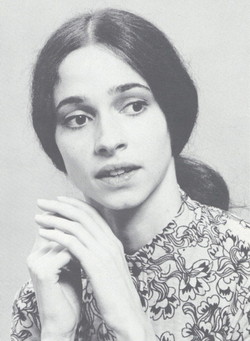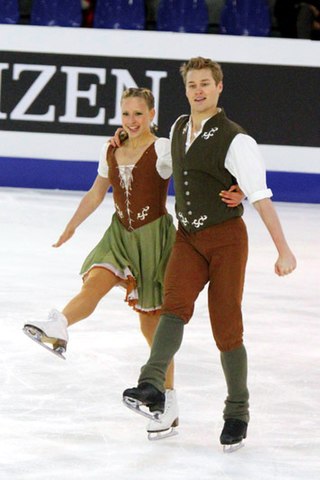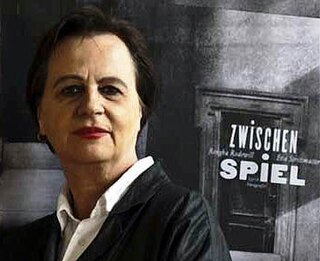Related Research Articles

The Komische Oper Berlin is a German opera company based in Berlin. The company produces operas, operettas and musicals.

Siegfried Matthus was a German composer, conductor, and festival founder and manager. Some of his operas, such as Judith, were premiered at the Komische Oper Berlin in East Berlin. In 1991, he founded the chamber opera festival Kammeroper Schloss Rheinsberg and directed it until 2018. In 2005, he composed a Te Deum for the reopening of the Dresden Frauenkirche. Matthus is considered one of Germany's most often performed contemporary composers.
Since the 18th century Berlin has been an influential musical center in Germany and Europe. First as an important trading city in the Hanseatic League, then as the capital of the electorate of Brandenburg and the Prussian Kingdom, later on as one of the biggest cities in Germany it fostered an influential music culture that remains vital until today. Berlin can be regarded as the breeding ground for the powerful choir movement that played such an important role in the broad socialization of music in Germany during the 19th century.
Hannelore Bey was a prima ballerina at the Komische Oper Berlin.

Grete Wiesenthal was an Austrian dancer, actor, choreographer, and dance teacher. She transformed the Viennese Waltz from a staple of the ballroom into a wildly ecstatic dance. She was trained at the Vienna Court Opera, but left to develop her own more expressive approach, creating ballets to music by Franz Schreker, Clemens von Franckenstein, and Franz Salmhofer, as well as dancing in her own style to the waltzes of Johann Strauss II. She is considered a leading figure in modern dance in Austria.

Eva Maria Evdokimova-Gregori was a Bulgarian-American Prima Ballerina Assoluta with the Royal Danish, Berlin Opera Ballets, English National Ballet and guest artist with virtually every major ballet company worldwide.

Tim Giesen is a German former competitive ice dancer. With Stefanie Frohberg, he placed 11th at the 2010 World Junior Championships and competed at two Grand Prix events.

Stefanie Frohberg is a German former competitive ice dancer. With Tim Giesen, she placed 11th at the 2010 World Junior Championships and competed at two Grand Prix events.

The Internationale Maifestspiele Wiesbaden is a theater festival in Wiesbaden, Germany. Established in the late 19th century after the Bayreuth Festival, the festival is one of the most distinguished international theatre and music festivals in the world. It is presented annually in May at the Hessisches Staatstheater Wiesbaden, the State Theatre of Hesse in the capital Wiesbaden. The festival currently features performances of operas, ballets, plays and musicals. Visiting companies, mostly from European theaters, present their recent productions along with performances of the Theater Wiesbaden. Concerts from a wide array of music genres are featured as well as artistic circus acts and modern dance presentations. Lectures, recitals, cabaret performances, art showings and readings are also part of the program.

Marcia Haydée Salaverry Pereira da Silva is a Brazilian ballet dancer, choreographer and ballet director. She was prima ballerina of the Stuttgart Ballet under John Cranko and succeeded him as the company's director, serving from 1976 to 1995. She has been director of the Santiago Ballet since 1992.

Tatjana Gsovsky was an internationally known ballet dancer and choreographer who was ballet mistress of the Berlin State Opera, Teatro Colón, Deutsche Oper Berlin and Oper Frankfurt. An influential teacher, she is remembered for first choreographies of works by contemporary composers including Boris Blacher, Werner Egk, Hans Werner Henze, Giselher Klebe, Luigi Nono and Carl Orff.

Edel von Rothe was a German ballet dancer with the Deutsche Oper am Rhein in Düsseldorf, where she became prima ballerina and ultimately ballet mistress.
Steffi Scherzer is a German ballet dancer, at the Berlin State Opera from 1975 to 2003, prima ballerina there from 1987, and director and instructor at the Tanz Akademie Zürich of the Zürcher Hochschule der Künste.

Martina Clausner is a German former figure skater who represented East Germany. She is the 1966 Prize of Moscow News champion, a two-time Blue Swords silver medalist, and a three-time East German national medalist, having won one silver and two bronze medals. She competed at three World Championships and three European Championships in the 1960s.

Rengha Rodewill is a German photographer, author, painter, graphic designer and dancer.

Frank Schneider is a German musicologist.

Ulrike Liedtke is a German musicologist and politician (SPD). From 1991 to 2014 she was founding director of the Musikakademie Rheinsberg. Since 2014 she has been a member of the Landtag of Brandenburg. After her re-election in 2019 she was elected President of the Landtag.
Clementine Edle von Schuch also Clementine von Schuch II bzw. jun.) was a German concert and operatic soprano, but also sang parts written for mezzo-soprano or alto.
Irina Liebmann is a German journalist-author and sinologist of Russo-German provenance. She has won a number of important literary prizes: the most significant of these, probably, was the 2008 Leipzig Book Fair non-fiction Prize, awarded for "Wäre es schön? Es wäre schön!", a biography of her father, a noted anti-Nazi activist and political exile in Warsaw and Moscow who, after 1945, returned to what became, in 1949, the German Democratic Republic and in 1953, despite his longstanding record of communist activism, emerged as an uncompromising critic of the East German leader Walter Ulbricht: he was expelled from the party and suffered various other government mandated public indignities. She grew up and lived the first part of her adult life in the German Democratic Republic, but succeeded in moving to West Berlin during 1988, thereby anticipating reunification by more than a year.

Elena Tsallagova is a Russian operatic soprano who has performed at major opera houses and festivals in Europe. She was noticed internationally as Nanetta in Verdi's Falstaff at the Glyndebourne Festival, and in the title role of Janáček's The Cunning Little Vixen at the Paris Opera. She has been a member of Deutsche Oper Berlin since 2013, performing lead roles such as Debussy's Mélisande, Gilda in Verdi's Rigoletto and Sophie in Der Rosenkavalier by Richard Strauss.
References
- 1 2 Abini Zöllner (8 June 2000). "Das Müssen wollen". Berliner Zeitung (in German). Retrieved 18 February 2014.
- 1 2 "Frohberg/Giesen festigen ihre Position in der Eistanz-Weltspitze!" (PDF) (in German). Neusser Schlittschuh-Klub. 3 October 2009. Retrieved 18 February 2014.
- ↑ GDR Review. Verlag Zeit im Bild. 1987.
- ↑ "Sind Ost-Frauen anders?author=Martina Rellin" (in German). Berliner Kurier. 14 March 2004. Retrieved 19 February 2014.
- ↑ Barry Mittan (5 October 2009). "Great Start for Germany's Frohberg and Giesen". Skate Today. Retrieved 19 February 2014.
- ↑ "Jutta Deutschland". IMDb (in German). Retrieved 19 February 2014.
- ↑ O'Sickey, ed. by Ingeborg Majer; Zadow, Ingeborg von (1998). Triangulated visions : women in recent German cinema. Albany: State university of New York press. p. 202. ISBN 0791437183.
{{cite book}}:|first=has generic name (help)